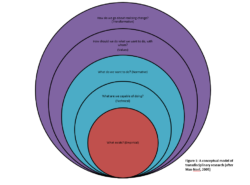Introducing the new Centre for Transdisciplinary Methodology
Written by Professor Nick Emmel

In this post, Professor Emmel explains the importance of transdisciplinary research and the aims of the new Centre for Transdisciplinary Methodology at Leeds University.
WE have recently established the Centre for Transdisciplinary Methodology in the School of Sociology and Social Policy at Leeds University. This blog considers five talking points, inviting the reader to think about the strengths and limits of disciplinary and interdisciplinary science. It also considers what a transdisciplinary methodology might add in a world where complex social problems are often the focus of our research. Finally, the blog outlines the activities of the new Centre.
Talking point 1: today’s complex problems require interdisciplinary science
It has been recognized for a long time across the sciences that the societal problems we want to tackle go well beyond the capacity of individual disciplines to address. Issues like how we respond to natural and human-made disasters and emergencies; the persistence and changing shape of poverty in a global world through to how labour markets operate in localities; the perpetuation of experiences of inequalities and the relational inequities in the distribution of resources and services that sustain these; and the ways in which we produce and circulate data and make sense of these data are examples of these problems. Individual disciplines provide invaluable problem-portable empirical insight. But attempts to produce over-arching explanations within single disciplines soon over-reach their capacities to explain these complex, multi-dimensional problems.
Talking point 2: the strength and limits to interdisciplinary science
The key strength of interdisciplinary science is the way in which it coordinates disciplines in a common cause. As examples, environmental science defines the purpose of ecology, soil science, geographical information systems and sociology to investigate human-made disasters such as deforestation; medicine defines the purpose of biology, chemistry, physiology and health science to treat a disease process. In each of these cases, empirical perspectives from each discipline are triangulated and integrated through drawing on the methods and concepts of the individual disciplines to produce new and valuable conceptual models. Key skills and insights from disciplines are mobilized at different stages in the design and implementation of research towards elaborating a solution. While very many valuable scientific discoveries arise from interdisciplinary science, these are constrained by the technical and normative limits of the disciplines involved.
Talking point 3: the added extra of a transdisciplinary methodology
Like interdisciplinary research, transdisciplinary research has its foundations in disciplines. But it encourages collaborators to think beyond their disciplines and their usual ways of working together in interdisciplinary teams to transform problems. Aboelela and colleagues define transdisciplinary research as working jointly to create new conceptual, theoretical, methodological, and translational innovations that integrate and move beyond discipline-specific approaches to address a common problem.
A transdisciplinary methodology engages with values, asking questions about how we should do the knowledge generation we want to do and with whom. It also seeks to transform the problems it investigates to consider how we might realize change.
Talking point 4: a conceptual model of a transdisciplinary methodology
 Figure 1 shows a conceptual model of transdisciplinary research. The inner core in red represents the empirical projects of disciplinary science. The middle core in blue represents the technical and normative agenda of interdisciplinary science. The outer mantle in purple represents the value-laden and transformative programme of a transdisciplinary methodology. Also highlighted in Figure 1 are the key questions asked in each of these domains of science. These range from the sure-footed and familiar questions rooted in methods and conceptual models of empirical disciplines and interdisciplinary science shown at the core. The mantle considers the ethical, philosophical and participatory questions of a transdisciplinary science. These may feel like anathema to many scientists trained in value-free objective science. Yet it seems most likely that these questions, alongside the questions at the core, are the very ones we must ask to tackle societal problems.
Figure 1 shows a conceptual model of transdisciplinary research. The inner core in red represents the empirical projects of disciplinary science. The middle core in blue represents the technical and normative agenda of interdisciplinary science. The outer mantle in purple represents the value-laden and transformative programme of a transdisciplinary methodology. Also highlighted in Figure 1 are the key questions asked in each of these domains of science. These range from the sure-footed and familiar questions rooted in methods and conceptual models of empirical disciplines and interdisciplinary science shown at the core. The mantle considers the ethical, philosophical and participatory questions of a transdisciplinary science. These may feel like anathema to many scientists trained in value-free objective science. Yet it seems most likely that these questions, alongside the questions at the core, are the very ones we must ask to tackle societal problems.
Talking point five: the aims of the Centre for Transdisciplinary Methodology
- The Centre will promote creative opportunities to develop a transdisciplinary methodology, including research across a wide range of topics drawing on multiple and often innovative methods.
- We will generate and disseminate knowledge about transdisciplinary methodologies to researchers, users of research and students.
- The Centre will provide a clearing house, an accessible point of contact for researchers from across the arts and humanities, social, natural and physical sciences, policy and programmes that face the challenges of researching complex social problems.
- We will collaborate with existing transdisciplinary research groups and networks in the UK and internationally.
- Although not principally a provider of continuing professional development or methods training, the Centre will contribute to a pedagogy of research methodology training through resources addressing a wide variety of audiences.
- The Centre will extend the benefit and changes to society, culture, public policy, economy and services through promoting the impact of our transdisciplinary methodological research and teaching.
References
-
ABOELELA, S. W., LARSON, E., BAKKEN, S., CARRASQUILLO, O., FORMICOLA, A., GLIED, S. A., HAAS, J. & GEBBIE, K. M. 2007. Defining interdisciplinary research: conclusions from a critical review of the literature. Health services research, 42, 329-346.
-
MAX-NEEF, M. 2005. Foundations of transdisciplinarity. Ecological Economics, 53, 5-16.
